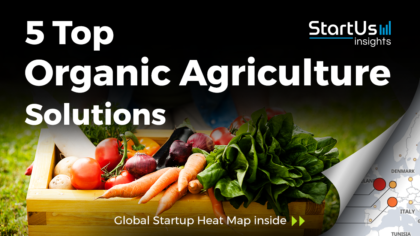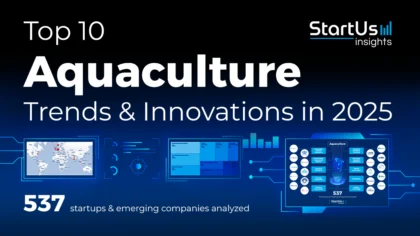Accelerate Productivity in 2025
Reignite Growth Despite the Global Slowdown
Staying ahead of the technology curve means strengthening your competitive advantage. That is why we give you data-driven innovation insights into the agriculture industry. This time, you get to discover 5 hand-picked organic agriculture solutions.
Out of 456, the Global Startup Heat Map highlights 5 Top Organic Agriculture Solutions
The insights of this data-driven analysis are derived from the Big Data & Artificial Intelligence-powered StartUs Insights Discovery Platform, covering 2 093 000+ startups & scaleups globally. The platform gives you an exhaustive overview of emerging technologies & relevant startups within a specific field in just a few clicks.
The Global Startup Heat Map below reveals the distribution of the 456 exemplary startups & scaleups we analyzed for this research. Further, it highlights 5 AgriTech startups that we hand-picked based on criteria such as founding year, location, funding raised, and more. You get to explore the solutions of these 5 startups & scaleups in this report. For insights on the other 451 organic agriculture solutions, get in touch.
Vise Organic delivers Organic Fertilizers
Fertilizers are necessary for farming, both in terms of quality and quantity of crop yield. However, the utilization of inorganic or artificial fertilizers surreptitiously affects the health of consumers. For example, fertilizers containing heavy metals damage internal organs such as kidneys. To prevent this, startups develop organic fertilizers that reduce or nullify health impacts.
Indian startup Vise Organic develops organic fertilizers. Soil Carbon is a product for increasing the organic carbon ratio in the soil. Potash Mobilizing Bacteria is a biological potash supplement for soil & plant. It consists of soil rocks and minerals in an accessible form for plants. Mycorrhiza 3000 IP is a product that forms a symbiotic association between plant roots and fungus. The startup develops other bioproducts for plants such as Azospirillum Liquid Based, Liquid NPK, and more.
Nox builds Hermetic Bags for Crop Protection
Plants are constantly subject to different forces of nature that impact growth and yield. Insects affect the yield of crops and further hampers plant growth, reducing the revenue for farmers. This includes damage during germination, sapling growth, or on the final crop. To curb this, startups develop novel solutions that prevent insects from spoiling crops. For example, using hermetically sealed bags ensures that insects do not have access to the plant.
French startup Nox develops hermetic bags for crop protection. The startup’s Nox big bag inflates with the requisite amount of carbon dioxide according to grain needs. The carbon dioxide inside the bag eliminates adult free-living insects on the outside of the grain as well as penetrates the material and exterminates insects in hidden forms like eggs, nymphs, or larvae. It, hence, prevents reinfestation as well as hampers biological and microbiological degradation of plants, reducing post-harvest storage losses.
Noocity provides Corporate Organic Vegetable Gardens
With a growing global population, land occupation also increases proportionally. As a result, the land available for farming decreases. Due to this, multi-purpose residential and commercial spaces now utilize free spaces to cultivate plants. These spaces allow for self-sustaining agriculture and optimize the usage of resources. Therefore, startups develop farming solutions that enable businesses to utilize urban spaces for growing crops.
Portuguese startup Noocity provides corporate organic farming services. The Noocity Growbed is an autonomous and productive urban farming ecosystem with integrated low-tech sub-irrigation. The Noocity Growers assist users in building a garden that fits customer needs and space. The setup provides measurable water savings and features an integrated vermicomposting option. The size of gardens varies from 2 m square to 2000 m square.
Carbon Robotics develops Autonomous Weeders
Weeds grow naturally in soil and divert nutrients and minerals from crops. They are antagonists of agricultural plants, affecting growth and yield. Herbicides are contemporary solutions to eliminating weeds. However, these synthetic compounds also impact crop yield, quality, and growth. They also deteriorate the soil quality, affecting long-term agriculture. To prevent this, startups develop mechanical solutions to weed control. This helps in maintaining crop health and yield without utilizing synthetic chemicals or herbicides.
US-based startup Carbon Robotics provides cultivators with autonomous weed control technology. The weeder tends to 200 acres to tens of thousands of acres with individual robots weeding 15-20 acres per day. Artificial intelligence (AI) powers the robot, utilizing Nvidia technology with 12 high-resolution cameras targeting weeds. The robots also incorporate crop and weed computer vision models that are effective in all lighting conditions. Thus, farmers gain the ability to rely on mechanical systems in curbing weeds in agriculture.
Nutrienvisus engineers Organic Plant Yield Supplements
Optimizing crop yield is essential to feed the growing population. This takes utmost precedence when considering the limitation of land for agriculture. However, most plant growth supplements consist of chemicals that adversely affect the health of consumers. Consequently, startups develop organic plant supplements that do not impact the body or organs of the consumer.
Canadian startup Nutrienvisus develops organic plant yield supplements. Enviotin Powder is a broad spectrum fertilizer boost that allows for efficient irrigation. The mixture is usable for all potted plants and is usable with other plant nutrients and probiotics. It allows greenhouse growers to optimize plant health and shelf-life, resulting in higher yields.
Discover more AgriTech Startups
AgriTech startups such as the examples highlighted in this report focus on urban agriculture and sustainable agriculture, soil health as well as artificial intelligence. While all of these technologies play a major role in advancing the agricultural industry, they only represent the tip of the iceberg. To explore more agricultural technologies, simply get in touch to let us look into your areas of interest. For a more general overview, you can download our free AgriTech Innovation Report to save your time and improve strategic decision-making.








